The Liberator Chronicles: Volume 8
Wednesday, 20 August 2014 - Reviewed by

The Liberator Chronicles: Volume 8
Written by Simon Guerrier, Marc Platt and James Goss
Directed by Lisa Bowerman and Ken Bentley
Released by Big Finish May 2014
Volume 8 of The Liberator Chronicles takes a different narrative approach in each of its three stories. President is performed in the present tense in the form of a conversation between Servalan (Jacqueline Pearce) and Secretary Rontane (Peter Miles). Sea of Iron is the closest to a conventional first person narration, although it is mostly told in the past tense by Cally (Jan Chappell) and occasionally by Servalan. Spoils is the most surreal of the three episodes, as Blake (Gareth Thomas) experiences a lurid dream that is administered by the mysterious Dream Makers (played by Jemma Churchill and Dan Starkey). All three tales provide us with new insights into the key characters – both for better and worse.
President is, of course, unique for featuring Servalan and not the Liberator crew at all. When the play opens, it appears the Federation’s Supreme Commander may have finally bitten off more than she can chew. This is Pearce’s moment to shine and she does not disappoint. She is ably supported by SF stalwart Peter Miles as Secretary Rontane, a close acolyte of the Terran Federation’s President. Miles effortlessly reprises the role that he played in two episodes of the original B7 TV series over 35 years ago. Of course, the scenario that author Simon Guerrier paints isn’t as obvious to the listener as it seems and the twist at the conclusion shows that Servalan is almost as masterful a manipulator as Guerrier is! Indeed, this episode works precisely because it beautifully exploits the audio medium. On television, a glance at the scenery of the conversation between Servalan and Rontane would immediately reveal the truth of the matter. On audio, the listener makes deductions from the dialogue and forms a picture in their own mind, both rightly and wrongly.
Although you might expect President to focus on the character recently played by Hugh Fraser in Big Finish’s first series of full cast B7 audio adventures, this is Servalan’s story and only features the title character indirectly. It is revealed that this is the same man who survives an assassination attempt on Mars (first mentioned in the B7 full cast audio Cold Fury) but as with the full cast plays, we only ever get a sketchy description of the President at best. Although Servalan describes him as a wiry, middle-aged man with a penchant for fine food, wine and “pretty young things”, he remains as anonymous and remote as he was in the TV series.
In fact, President focuses more on the internal power struggle in the Federation Council and the political situation across a host of Federation worlds and moons. Although we’re not meant to sympathise with the regime’s inherent brutality, the story gives us some insight into the geopolitical problems the Federation has to contend with, eg rationing, starvation, overpopulation, a failing welfare state, a corrupt bureaucracy – all good reasons why some Federation citizens could identify with the ideals of Blake’s crusade and take up arms. It is clear that the President, Servalan and Rontane have no interest in the people they are meant to serve – they will show the populace they care through a series of well staged PR exercises yet will do nothing to solve society’s ills.
Sea of Iron is a more conventional B7 story than President and probably the “oddball” in this trilogy of audio plays. That isn’t because it’s a radical or odd story, merely it is bookended by two stories with overtly political themes and is more of a typical B7 adventure. Marc Platt’s script focuses predominantly on Cally and her estrangement from her home world of Auron, with some devious shenanigans from Servalan on the side. Although it’s a story ostensibly set in the second season of the TV series (with Blake and Jenna still aboard the Liberator), it could just as easily fit into B7’s later run. Servalan, again performed with relish by Pearce, takes centre stage as the villain in this episode, much as she did in B7’s third and fourth seasons, and the story itself serves as a prequel to the third season episode Children of Auron.
What probably makes Sea of Iron fit in this boxset is the loose theme of betrayal that underscores this trilogy of tales – Cally must wrestle with the truth that her mentor is not the man he once was while the Auron government is also revealed to compromise its strong beliefs of isolation, much to Cally’s horror (it was this isolationist policy, of course, which persuaded Cally to leave her world in the first place).
Spoils is the most intriguing of the three plays. B7 in its TV run never tried stories featuring alternate timelines or parallel universes – scenarios that are a staple of the likes of Doctor Who, Star Trek and even Stargate. While it’s fascinating to take a sneak peak at what could have been or never was, these series have always run the danger of frustrating their audiences if the outcome of a story set in an alternate future negates the very purpose of the story! Fortunately, Spoils author James Goss skilfully assures the listener from the outset that there is a purpose behind the story – to show Blake through a virtual reality dream-like scenario that winning the peace after the fall of the Federation will be more difficult than winning the war. In turn, it is later revealed that it is not just us as the audience that is privy to Blake’s dream but someone else with an agenda ...
All the same, Goss provides us with a fascinating picture of what could have – or would have – happened if Blake and the Liberator crew had succeeded. Like in President, we catch glimpses of a Federation that is so systemically corrupt that no amount of goodwill on the part of any one politician can change it because he/she will always be frustrated or betrayed by other factions. Even though he sets out from the beginning of his presidency to do all the right things and to honour the trust that the Federation’s adoring citizens bestow on him, the task for Blake proves insurmountable – he finds that for every political spot fire he tries to put out, an even bigger one burns brightly in its place. By the end of the play President Blake, both through his own faults and due to external factors, has succumbed to absolute power and become as tyrannical as Servalan or Hugh Fraser’s President.
Gareth Thomas clearly enjoys the opportunity to play an older, wearier and embittered Blake, probably in accordance with his own age today (the conclusion of the play occurs only five years after his apparent victory but it would have been more realistic if it had been set 10, perhaps even 20 years later). Thomas is ably complemented by Dan Starkey (better known as Doctor Who’s Strax!) and Jemma Churchill who portray the mysterious Dream Makers and also double as a host of characters including regulars Avon, Jenna, Cally, Vila and Zen. No doubt for Starkey’s inner fanboy it would be a dream come true to be playing iconic parts like Avon, Vila and Zen. Sadly, as competent as Starkey and Churchill are, I think the narrative would be more convincing if Paul Darrow and Sally Knyvette had played Avon and Jenna respectively and doubled as the Dream Makers and some of the other characters. Starkey and Churchill’s portrayals of Avon and Jenna are horrible caricatures (far from being “jaw-droppingly” accurate as Goss recently told Big Finish’s Vortex magazine). Churchill and Starkey do enough at certain times of the narrative to make you believe they could be Avon and Jenna (or at least the Dream Makers masquerading as them) but otherwise their performances will grate on the listeners who know these characters best.
Nevertheless, the story, the production and the performances produce some powerful images that homage the TV series, particularly in the second half of the play. We see President Blake lead a massacre similar to the one he witnessed in the TV series opener The Way Back. He is then thrust into a final confrontation with Avon and the Liberator which echoes the TV series’ final climactic moments (indeed, I count this as the third time Big Finish have homaged the final moments of the series finale Blake — the B7 audios twice, together with the novel The Forgotten). Unfortunately the surprise twist is spoiled by Churchill’s hammy acting (“Maximum power!”).
The Liberator Chronicles Volume 8 is therefore a mixed bag of stories. President and Spoils are by far the better instalments, with overt political themes (one of B7’s strengths), while Sea of Iron is the weakest link (sadly reiterating a complaint of many long-time B7 fans that Cally-focused stories were often the dullest!). Again, you could construe betrayal as the underlying theme of these stories (it was definitely a recurring theme in the TV series) — that’s certainly the case in President, in the deeply personal revelations for Cally, and in Blake’s reaction to his dream-like experience. The characters in each of the stories learn something new about their place in the universe — and for Blake and Cally in particular, each revelation rocks them to the core of his and her being.





